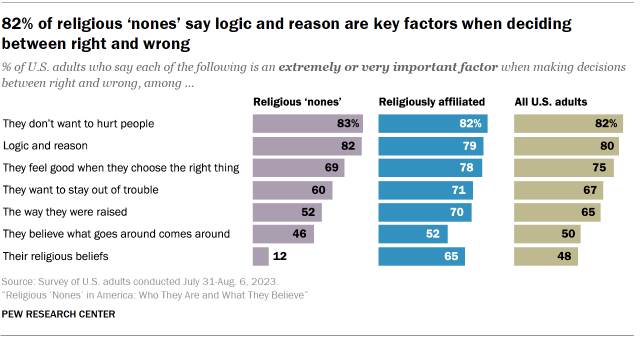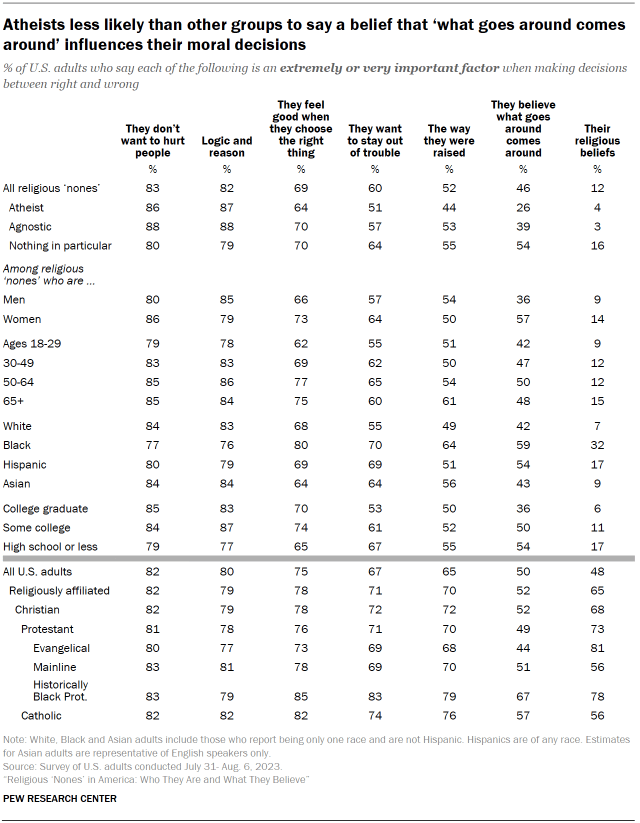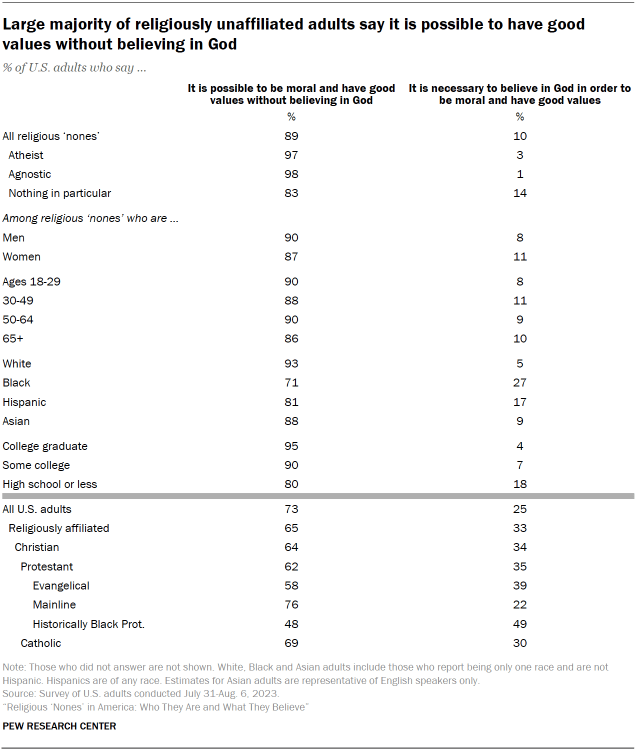When making decisions between right and wrong, most “nones” say they rely extensively on the desire to avoid hurting people, and on the use of logic and reason.
Overall, 83% of “nones” say the desire to avoid harming other people is extremely or very important to them when making moral decisions, while 82% say the same about the use of logic and reason.

Majorities of “nones” also say feeling good when they choose right over wrong factors into their decision-making (69%), as does the desire to stay out of trouble (60%).
Like most “nones,” most religiously affiliated Americans cite each of these four considerations – not wanting to hurt people, logic and reason, feeling good when choosing the right thing, and wanting to stay out of trouble – as key factors when making decisions between right and wrong.
What most distinguishes “nones” on this survey question is a lack of reliance on religious beliefs. Just 12% of “nones” say they rely heavily on religious beliefs in deciding between right and wrong, compared with 65% of U.S. adults who identify with a religion.
Factors that influence decision-making about right and wrong
To probe the way people describe their moral calculations, the survey asked: “How important are each of the following factors when you make decisions between right and wrong?” It then listed seven possible factors, such as “your religious beliefs,” “the way you were raised,” and “logic and reason.” Respondents were asked to say whether each of the seven factors was extremely, very, somewhat, not too, or not at all important when choosing between right and wrong.
On many factors, there are relatively small differences between atheists, agnostics and adults who describe their religion as “nothing in particular.” However, just over half of respondents whose religion is “nothing in particular” say the belief that “what goes around comes around” is an extremely or very important factor when they make moral decisions, which is notably higher than the share of agnostics and atheists who say this.
Religiously affiliated adults are much more likely than “nones” to say their religious beliefs and the way they were raised play an extremely or very important role when they are making moral decisions.

Views on whether belief in God is necessary for morality
Almost all agnostics (98%) and atheists (97%) say it is possible to be moral and have good values without believing in God. A somewhat smaller majority of those who describe their religion as “nothing in particular” say this (83%).
Just 10% of “nones” overall say belief in God is necessary to be moral and have good values.
There are few differences by gender and age on this question among “nones.” And majorities of “nones” in all racial and ethnic categories agree it’s possible to be moral without believing in God.
However, 27% of Black “nones” say it is necessary to believe in God to be moral and have good values, which is higher than the shares of Hispanic, Asian or White “nones” who say this.
Among adults who identify with a religion, 65% say it’s possible to be moral and have good values without believing in God, while one-third say belief in God is necessary to be moral and have good values.

Return to the report’s Overview.
Find answers to other questions:
- Who are the ‘nones’? How are they defined? (Chapter 1)
- Why are ‘nones’ nonreligious? (Chapter 2)
- Are ‘nones’ less involved in civic life than people who identify with a religion? (Chapter 3)
- Are all ‘nones’ nonbelievers? (Chapter 4)
- Are ‘nones’ spiritual instead of religious? (Chapter 5)
- Are ‘nones’ hostile toward religion? (Chapter 6)
- How do ‘nones’ view science? (Chapter 7)




